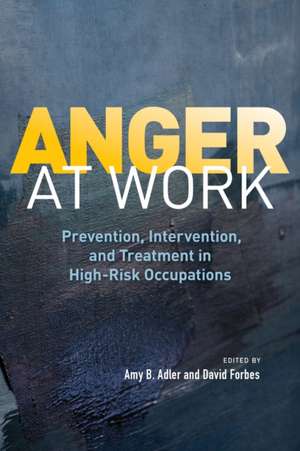Anger at Work: Prevention, Intervention, and Treatment in High-Risk Occupations
Autor Amy B. Adler, David Forbesen Limba Engleză Paperback – 26 iul 2021
Preț: 376.77 lei
Preț vechi: 394.62 lei
-5% Nou
72.10€ • 74.49$ • 59.98£
Carte indisponibilă temporar
Specificații
ISBN-10: 1433833077
Pagini: 336
Dimensiuni: 198 x 230 x 23 mm
Greutate: 0.48 kg
Editura: Wiley
Descriere
Anger is a source of diminished functioning and performance at work, and can have negative consequences for individuals, teams, and organizations.
Problematic anger can cause major disruptions in the workplace and negatively influence individual performances as well as health and well-being across entire organizations. This is a particularly serious problem in high-risk occupations, where the consequences of prolonged, unhealthy anger can be devastating.
This book reveals the impact of anger on job performance and in the workplace context, with a particular focus on police, firefighters, and the military. This book aims to help researchers and practitioners distinguish healthy from unhealthy, unproductive anger and to understand its links to problems such depression, alcohol abuse, and PTSD.
Contributors examine new and useful conceptual frameworks such as moral injury, and typical risk factors and behaviors including risk-taking, irritability, hypervigilance, and chronic physiological activation. Anger is examined within individual and team contexts. Treatments and interventions, including cognitive bias modification, are presented to help clinicians and practitioners put these insights to practical use.
Notă biografică
Cuprins
Acknowledgments
Why Anger Matters: An Introduction
I. Foundations
Chapter 1. An Overview of Anger: A Common Emotion With a Complicated Backstory
II. Organizational Context
Chapter 3. Moral Injury and Anger in the Workplace
III. Clinical Context
Chapter 6. Anger in Occupations Characterized by Repeated Threat and Stress Exposure: The Longitudinal View in the Military Context
IV. Future Directions
Chapter 10. Advancing Anger Research
Index
About the Editors
